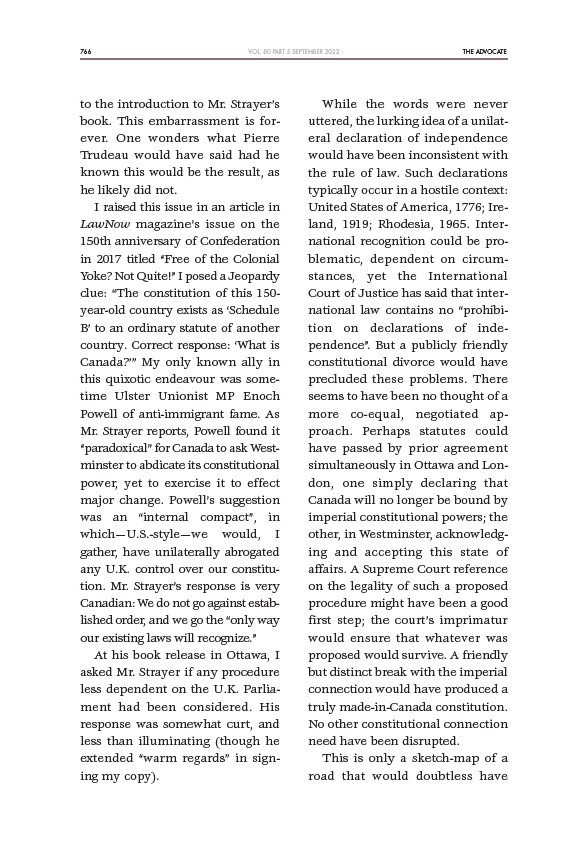
766 THE ADVOCATE
VOL. 80 PART 5 SEPTEMBER 2022
to the introduction to Mr. Strayer’s
book. This embarrassment is forever.
One wonders what Pierre
Trudeau would have said had he
known this would be the result, as
he likely did not.
I raised this issue in an article in
LawNow magazine’s issue on the
150th anniversary of Confederation
in 2017 titled “Free of the Colonial
Yoke? Not Quite!” I posed a Jeopardy
clue: “The constitution of this 150-
year-old country exists as ‘Schedule
B’ to an ordinary statute of another
country. Correct response: ‘What is
Canada?’” My only known ally in
this quixotic endeavour was sometime
Ulster Unionist MP Enoch
Powell of anti-immigrant fame. As
Mr. Strayer reports, Powell found it
“paradoxical” for Canada to ask Westminster
to abdicate its constitutional
power, yet to exercise it to effect
major change. Powell’s suggestion
was an “internal compact”, in
which—U.S.-style—we would, I
gather, have unilaterally abrogated
any U.K. control over our constitution.
Mr. Strayer’s response is very
Canadian: We do not go against established
order, and we go the “only way
our existing laws will recognize.”
At his book release in Ottawa, I
asked Mr. Strayer if any procedure
less dependent on the U.K. Parliament
had been considered. His
response was somewhat curt, and
less than illuminating (though he
extended “warm regards” in signing
my copy).
While the words were never
uttered, the lurking idea of a unilateral
declaration of independence
would have been inconsistent with
the rule of law. Such declarations
typically occur in a hostile context:
United States of America, 1776; Ireland,
1919; Rhodesia, 1965. International
recognition could be pro-
blematic, dependent on circumstances,
yet the International
Court of Justice has said that international
law contains no “prohibition
on declarations of inde-
pendence”. But a publicly friendly
constitutional divorce would have
precluded these problems. There
seems to have been no thought of a
more co-equal, negotiated ap-
proach. Perhaps statutes could
have passed by prior agreement
simultaneously in Ottawa and London,
one simply declaring that
Canada will no longer be bound by
imperial constitutional powers; the
other, in Westminster, acknowledging
and accepting this state of
affairs. A Supreme Court reference
on the legality of such a proposed
procedure might have been a good
first step; the court’s imprimatur
would ensure that whatever was
proposed would survive. A friendly
but distinct break with the imperial
connection would have produced a
truly made-in-Canada constitution.
No other constitutional connection
need have been disrupted.
This is only a sketch-map of a
road that would doubtless have